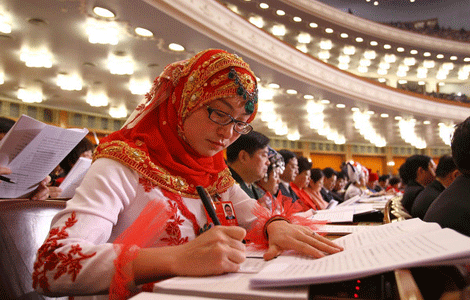 |
|
|
|
|||||||||
BEIJING - Thirty female lawmakers and political advisors from Zhejiang province finally have given up their extraordinary plan of wearing "qipao" at the opening of the annual parliamentary session Monday morning.
Their plan of wearing tailor-made chi-paos, a kind of traditional long gown with a slit skirt, instead of the usual suits, was disclosed Sunday by local media in the eastern province and triggered heated discussions on major microblog portals.
During China's annual political sessions of the top legislature and political consultative body, most deputies and delegates choose to wear formal suits except those representing ethnic minorities.
In recent years, a number of deputies and delegates have chosen to wear something different, though their unusual attires have not been widely welcomed.
The overwhelming opinion on the Zhejiang delegation's move was that such "innovative" dressing would be improper for the formal occasion, but some believed it could add some flare to the female participants' style.
"It's hard to tell whether they are elected to handle political affairs or to do catwalk in fashion shows," said a popular entry posted by Linqi99 at weibo.com, which had been forwarded over 27,000 times by Monday morning with over 6,000 comments.
Many also posted questions on who was going to pay for the expensive silk clothes and requested for clarification.
Similar concerns were raised when deputies were spotted wearing luxurious accessories and jewels, while the public generally expect them to keep a low profile.
Like never before, the public is able to carefully see the behaviors, speeches and the dress style of their elected deputies.
With the booming of social networking services in China, especially microblog, details of those deputies and delegates have become accessible to everyone and open for criticism.
The Microblog medium has pierced the veil between the political sessions and the general public, said Zhang Quanling, popular anchor with the China Central Television and also a microblogger with 2.8 million followers.
Many legislators and deputies also use their microblog to solicit opinions for their motions or proposals.
Wu Ying, iPad, Jeremy Lin, Valentine's Day, Real Name, Whitney Houston, Syria,Iranian issue, Sanyan tourism, Giving birth in Hong Kong, Cadmium spill, housing policy

|

|

|

|

|

|